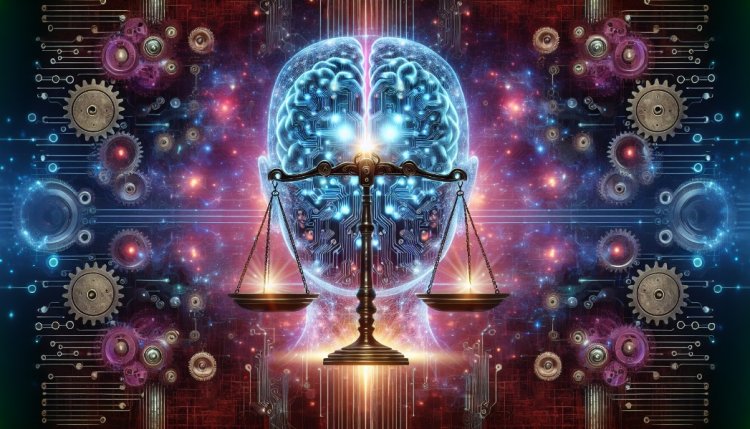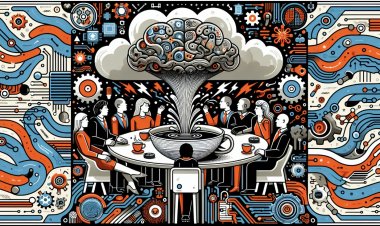The Power and Ethics of Artificial Intelligence
"Explore the complex world of Artificial Intelligence, delving into its immense power and the ethical considerations it raises. This article examines AI's transformative potential across industries, its impact on society, and the crucial ethical guidelines needed to navigate its future responsibly."

An Introduction to Artificial Intelligence
Artificial intelligence (AI) is an evolving technology that has the potential to revolutionise various aspects of daily life, work, medicine, and more. It refers to the development of computer systems that can perform tasks that typically require human intelligence, such as visual perception, speech recognition, decision-making, and problem-solving.
The impact of AI on daily life can be profound. It has the potential to enhance convenience and efficiency in various ways, such as self-driving cars that can navigate roads safely, smart assistants that can perform tasks and answer questions, and personalised recommendations for products and services. AI can also revolutionise the field of medicine by enabling faster and more accurate diagnoses, improving treatment plans, and enhancing patient care.
However, along with the potential benefits, there are also concerns surrounding AI. Some people worry about the dystopian implications of AI, such as loss of privacy and total surveillance. With the increasing use of AI in various industries, there is a fear that jobs may become obsolete as intelligent robots take over tasks traditionally performed by humans.
It is essential to approach the development and implementation of AI with caution and ethical considerations. Regulations and guidelines need to be in place to ensure that AI is used responsibly and in the best interest of humanity. Transparency and accountability are crucial to addressing the concerns surrounding AI and ensuring that it is harnessed for the greater good.
The Influence of AI in Retail
Artificial intelligence (AI) has been making significant strides in various industries, and one area that has been greatly impacted is retail. The integration of AI technology in retail has revolutionised the shopping experience, enhancing convenience and efficiency for consumers.
One notable example of AI in retail is Amazon Go, a new type of supermarket that utilises AI to provide a cashier-less shopping experience. Shoppers can enter the store by scanning their mobile phones, and then AI-powered sensors and cameras track their movements and purchases. This allows customers to simply walk out of the store without the need for traditional checkout processes. Amazon plans to open 50 more grocery stores using this technology, further showcasing the growing influence of AI in retail.
Another exciting development is the emergence of robot cafes. These cafes utilise AI and robotics to automate the process of taking orders and serving customers. Customers can place their orders through mobile apps or touch screens, and then watch as robots prepare and serve their beverages. This integration of AI not only enhances the efficiency of service but also provides a unique and futuristic experience for customers.
While AI technology has undoubtedly transformed the retail landscape, it also raises important considerations regarding employees and privacy. The implementation of AI in retail has the potential to significantly impact the workforce. As more tasks become automated, there is a concern that traditional retail jobs may become obsolete. Businesses must address these concerns and provide support and retraining opportunities for employees affected by AI integration.
Privacy is another critical aspect to consider. AI-powered retail systems, such as Amazon Go, rely on extensive data collection and surveillance. The cameras and sensors used to track customer movements raise questions about the balance between convenience and privacy. Companies need to prioritise transparency and establish clear guidelines to ensure customer data is protected and used responsibly.
The influence of AI in retail is undeniable. It has the power to transform the shopping experience, streamline operations, and improve efficiency. However, businesses must also consider the implications for employees and the need for privacy regulations. By approaching AI implementation responsibly and ethically, retail can fully harness the potential of this technology while ensuring the well-being of both employees and consumers.
AI in medicine
Artificial intelligence (AI) is revolutionising the field of medicine, offering new possibilities for faster and more accurate diagnoses, improved treatment plans, and enhanced patient care. AI refers to the development of computer systems that can perform tasks that typically require human intelligence, such as visual perception, speech recognition, decision-making, and problem-solving.
Overview of AI's role in medicine
AI algorithms are being developed to analyse medical data and images, such as X-rays, CT scans, and MRIs, to detect diseases and abnormalities. These algorithms can quickly and accurately identify patterns and indicators that may be difficult for human doctors to spot. By processing vast amounts of medical data, AI can assist in diagnosing diseases, predicting outcomes, and recommending treatment plans.
Case study: AI algorithm for X-ray diagnosis
One notable case study is the development of an AI algorithm at Stanford University that can screen X-rays for certain diseases. The algorithm was trained using a large dataset of chest X-rays that were labelled with different pathologies. When tested against radiologists, the algorithm showed similar levels of accuracy in diagnosing various pathologies and, in some cases, even outperformed the radiologists.
The AI algorithm allows healthcare professionals to upload X-ray images and receive a diagnosis within seconds. This can significantly speed up the diagnostic process, especially in cases where time is of the essence, such as identifying potentially cancerous lesions.
Comparison of AI accuracy with doctors' expertise
While AI algorithms are proving to be highly accurate in diagnosing certain conditions, it is important to note that they are not meant to replace human doctors. AI can be a useful tool for doctors to use in making diagnoses, but a healthcare professional should always make the final call. Doctors bring their expertise, experience, and clinical judgement to the table, which is crucial in providing comprehensive patient care.
Furthermore, AI algorithms may still have limitations and may not be as accurate in diagnosing complex conditions or rare diseases. They cannot also consider the patient's medical history, symptoms, and other contextual information that a doctor takes into account when making a diagnosis.
Ethical considerations and the need for regulation
The use of AI in medicine raises important ethical considerations. Privacy, data security, and patient consent are crucial considerations when using AI algorithms that rely on vast amounts of personal medical data. Healthcare providers and technology companies need to prioritise transparency, establish clear guidelines, and ensure that patient data is protected and used responsibly.
There is also a need for regulation to ensure that AI in medicine is used responsibly and in the best interest of patients. Regulatory bodies can establish guidelines and standards for the development, use, and validation of AI algorithms in healthcare. This can help prevent potential biases, ensure accuracy, and maintain the highest standards of patient care.
In conclusion, AI has the potential to revolutionise the field of medicine by enhancing diagnostic accuracy, improving treatment plans, and optimising patient care. However, it is important to recognise the limitations of AI and the importance of human expertise in the healthcare system. Ethical considerations and regulation are necessary to ensure that AI is used responsibly and for the benefit of patients.
AI in Diagnosis and Early Intervention
Artificial intelligence (AI) has the potential to revolutionise the field of medicine by improving diagnostic accuracy, enabling early intervention, and enhancing patient care. The development of AI algorithms that can analyse medical data and images has opened up new possibilities for diagnosing diseases and predicting outcomes.
Exploration of AI's potential in diagnosing diseases
AI algorithms have shown promise in detecting diseases and abnormalities by analysing medical data and images such as X-rays, CT scans, and MRIs. These algorithms can quickly and accurately identify patterns and indicators that may be difficult for human doctors to spot. By processing vast amounts of medical data, AI can assist in diagnosing diseases, predicting outcomes, and recommending treatment plans.
Case study: AI algorithm for detecting Parkinson's disease
One notable case study is the development of an AI algorithm at Stanford University that can screen X-rays for certain diseases. The algorithm was trained using a large dataset of chest X-rays labelled with different pathologies. When tested against radiologists, the algorithm showed similar levels of accuracy in diagnosing various pathologies and, in some cases, even outperformed the radiologists. This AI algorithm allows healthcare professionals to upload X-ray images and receive a diagnosis within seconds, significantly speeding up the diagnostic process.
Discussion of the ethical implications and privacy concerns
The use of AI in medicine raises important ethical considerations and privacy concerns. AI algorithms rely on vast amounts of personal medical data, raising questions about privacy, data security, and patient consent. Healthcare providers and technology companies must prioritise transparency, establish clear guidelines, and ensure that patient data is protected and used responsibly. It is essential to strike a balance between the convenience and benefits of AI technologies and the protection of patient privacy.
The importance of responsible AI development
Responsible AI development is crucial to ensuring that AI in medicine is used ethically and in the best interest of patients. Regulations and guidelines are necessary to address potential biases, ensure accuracy, and maintain the highest standards of patient care. Regulatory bodies can establish guidelines and standards for the development, use, and validation of AI algorithms in healthcare. By approaching AI implementation responsibly, the potential benefits of AI in medicine can be realised while ensuring the well-being and privacy of patients.
AI and surveillance in China
In recent years, China has made significant advancements in the development and implementation of artificial intelligence (AI). To become the global leader in AI by 2030, the Chinese government has invested billions of dollars in subsidy programs to support AI research and development. This commitment has led to rapid progress in various sectors, including surveillance and control.
Insight into China's AI development
China's focus on AI development has allowed the country to implement cutting-edge technologies in surveillance systems. For example, Amazon Go-style stores, which utilise AI to track customer movements and purchases, have become increasingly popular in China. These stores offer a cashier-less shopping experience, improving convenience and efficiency for consumers.
Additionally, robot cafes have emerged in China, where AI and robotics are used to automate order-taking and serving. Customers can place their orders through mobile apps or touch screens, and robots prepare and serve their beverages. These advancements in AI demonstrate China's commitment to integrating technology into everyday life.
Overview of AI applications in surveillance and control
In China, AI is being used extensively in surveillance and control systems. Smart cities, such as the Longgang district in Shenzhen, utilise AI-powered control centres to monitor and optimise various aspects of urban life, including transportation, public safety, and infrastructure. The surveillance systems in these cities utilise AI algorithms to analyse data and identify potential security risks or illegal activities.
The use of AI in surveillance has led to a significant increase in public safety and crime-solving rates. Cameras equipped with intelligent image recognition can track individuals and objects in real-time, aiding law enforcement agencies in identifying and apprehending suspects.
Discussion of the trade-off between security and privacy
While AI-powered surveillance systems offer enhanced security and safety, there is a trade-off between security and privacy. These systems rely on extensive data collection and surveillance, raising concerns about the balance between convenience and privacy. Privacy regulations and guidelines need to be in place to ensure that individuals' personal data is protected and used responsibly.
Consideration of cultural differences in the acceptance of surveillance
It is important to consider cultural differences when examining the acceptance of surveillance in China. In Chinese society, there is a different tradition and view of surveillance compared to Western cultures. The Chinese value public safety and see surveillance as a means to achieve it. The trade-off between security and privacy is perceived differently, and there is greater acceptance of surveillance systems in exchange for enhanced safety and public order.
However, it is essential to strike a balance between the benefits of surveillance and the protection of individual privacy rights. Transparency, accountability, and regulation are necessary to ensure that AI-powered surveillance systems are used responsibly and in the best interest of society.
Influence and Regulation of Tech Giants
As artificial intelligence (AI) continues to evolve and shape various aspects of society, the power and influence of tech giants like Google and Facebook cannot be ignored. These companies have become synonymous with innovation and have the resources to drive significant change in the AI industry.
One area of concern is the lobbying activities of these tech giants. With their vast financial resources, they can influence policy decisions and shape regulations that govern the use of AI. This raises concerns about potential conflicts of interest and the need for transparency in decision-making processes.
Furthermore, there are concerns over the growing monopolistic power of tech giants. As they continue to acquire smaller companies and expand their reach, there is a fear that competition will be stifled, leading to limited options for consumers and potentially higher prices. This concentration of power in the hands of a few companies raises questions about fair competition and the need for antitrust regulations in the AI industry.
In light of these concerns, there is a growing need for regulation and ethical considerations in the AI industry. Regulation is necessary to ensure that AI is developed and implemented responsibly, with the best interests of society in mind. Guidelines and standards can help address issues such as privacy, data security, and the responsible use of AI algorithms.
Ethical considerations are also crucial in the development and use of AI. As AI algorithms become more advanced and have the potential to make life-altering decisions, it is important to ensure that these decisions are made ethically. This includes addressing biases in algorithms, ensuring fairness and accountability, and considering the potential impact on individuals and society as a whole.
In conclusion, the power and influence of tech giants like Google and Facebook cannot be underestimated in the AI industry. Their lobbying activities and concerns over monopolies highlight the need for regulation and ethical considerations. By ensuring transparency, promoting competition, and addressing ethical concerns, the AI industry can continue to innovate and benefit society while maintaining the well-being of individuals and protecting their rights.
Challenges and Realities of Self-Driving Cars
Exploration of the progress and challenges in developing self-driving cars
Self-driving cars have been a topic of great interest and excitement in recent years. The development of autonomous vehicles has presented immense opportunities for enhancing road safety, improving transportation efficiency, and revolutionising the way we travel. However, the progress in developing self-driving cars has not been without its challenges.
One of the main challenges in developing self-driving cars is the technical requirements and limitations. While significant advancements have been made in mapping and localization technologies, there are still many areas that require improvement. For example, self-driving cars need to be able to accurately interpret and respond to complex real-world scenarios, such as unpredictable human behaviour or adverse weather conditions. The development of algorithms that can make split-second decisions in these situations is a major technical challenge.
Discussion of the technical requirements and limitations
Another challenge is the need for extensive testing and validation to ensure the safety and reliability of self-driving cars. Autonomous vehicles must undergo rigorous testing in various environments and scenarios to demonstrate their ability to operate safely on public roads. This testing process can be time-consuming and costly, but it is necessary to build trust and confidence in the technology.
Furthermore, there are limitations to what self-driving cars can currently achieve. While they have the potential to significantly reduce accidents caused by human error, they are not immune to technical failures or unexpected situations. The development of fail-safe mechanisms and redundancy systems is crucial to mitigate these risks and ensure the safety of passengers and other road users.
Ethical considerations in programming autonomous vehicles
One of the most complex challenges in developing self-driving cars is the ethical considerations in programming autonomous vehicles. Self-driving cars need to make decisions in critical situations, such as when faced with an unavoidable accident. These decisions raise important ethical questions, such as how to prioritise the safety of passengers versus pedestrians or how to handle situations where all options may result in harm.
To address these ethical considerations, researchers have conducted studies, such as the Moral Machine Survey, to gather public opinions on how self-driving cars should make these decisions. The survey presents respondents with various hypothetical scenarios and asks them to choose between different outcomes. The results of these surveys help inform the development of ethical guidelines and decision-making algorithms for autonomous vehicles.
Insight into the Moral Machine Survey
The Moral Machine survey has provided valuable insights into the ethical preferences of individuals from different cultures. For example, the survey has shown that people generally prioritise saving more lives and protecting vulnerable individuals, such as children, over other factors. However, there are also cultural differences in how people prioritise certain outcomes. For instance, the survey revealed that Germans tend to prefer inaction in critical situations, while the French are more inclined to rely on the decision-making abilities of autonomous vehicles.
These insights highlight the importance of considering cultural values and preferences when developing ethical guidelines for self-driving cars. It is essential to strike a balance between prioritising safety and ensuring that the decisions made by autonomous vehicles align with societal values.
Conclusion
Artificial intelligence (AI) is rapidly evolving and has the potential to revolutionise various aspects of society. From retail to medicine, AI is already making significant strides and transforming industries. However, as AI becomes more integrated into our daily lives, it is important to reflect on its current state and consider the ethical questions and responsibilities surrounding this technology.
AI has had a profound impact on society, enhancing convenience, efficiency, and the overall customer experience. We have seen examples of its influence in retail, with stores like Amazon Go providing cashier-less shopping experiences and robot cafes automating order-taking and serving. In medicine, AI algorithms have demonstrated impressive accuracy in diagnosing diseases and abnormalities from medical images such as X-rays.
While the benefits of AI are evident, it is crucial to approach its development and implementation with caution and ethical considerations. The rise of AI raises concerns about privacy, job displacement, and the potential for a dystopian society with total surveillance. These concerns highlight the need for regulation and guidelines to ensure that AI is used responsibly and for the greater good of humanity.
Transparency, accountability, and the protection of individual privacy rights are essential to addressing these concerns. Companies and regulatory bodies must prioritise these values to ensure that AI technology is developed and used ethically. Additionally, the development of AI algorithms must consider cultural differences and societal values to ensure that decisions made by AI systems align with the preferences of individuals and communities.
While AI has the potential to bring about significant advancements and improvements in various industries, it is important to maintain a critical perspective and consider the ethical implications and responsibilities associated with this technology. By doing so, we can harness the power of AI for the benefit of society while ensuring the protection of individual rights and well-being.



 admin
admin 










